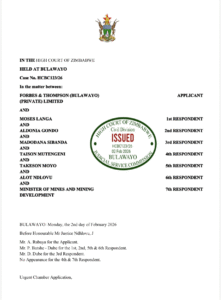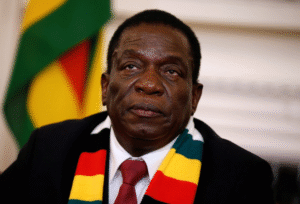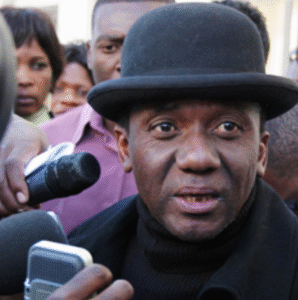UNBOWED AND UNBROKEN: THE RESILIENT SPIRIT OF ZIMBABWE’S JOB SIKHALA

In an extraordinary testament to the indomitable spirit of defiance and resilience, Job Sikhala, a towering figure in the political landscape of Zimbabwe, has been convicted on charges of inciting violence. This verdict represents a pivotal moment in the enduring battle against governmental repression within the nation. Despite the serious implications of his situation, Sikhala, who was brought before the court in leg irons, exhibited an unshakable resolve. His words, “Let them do what they want. I don’t care, don’t worry,” echo as a powerful declaration of his unwavering fortitude.
Sikhala, celebrated as a symbol of resistance against the oppressive measures of the Zimbabwean government, has consistently been a source of irritation for those in power. His relentless dedication to denouncing injustice and championing the principles of democracy has garnered him both respect and hostility. His conviction is perceived by numerous observers as a significant setback in the crusade for liberty and justice in a country beleaguered by political turmoil and violations of human rights.
The backdrop of Sikhala’s conviction is the government’s persistent endeavors to quell dissenting voices. The accusation of inciting violence, frequently wielded against adversaries in various authoritarian regimes, is typically employed as a mechanism to curb opposition and consolidate control. Critics contend that such allegations are unfounded and serve merely as excuses to target individuals who oppose the prevailing authorities.
The trial of Job Sikhala was enveloped in contention. Human rights organizations and global observers have voiced concerns regarding the fairness of the judicial process and the impartiality of Zimbabwe’s courts. Accusations of political meddling and the exploitation of the legal system to quash dissent have cast doubts on the legitimacy of the proceedings.
In spite of these obstacles, Sikhala’s conduct in court was marked by steadfast determination. His pronouncement, issued while restrained in chains, transcended personal defiance, embodying a call to arms for all those desiring a democratic and equitable Zimbabwe. It underscored the bravery required to confront an autocratic regime and the personal sacrifices entailed in such resistance.
The response to Sikhala’s conviction has been mixed. Proponents of the government regard it as a justified measure to preserve law and order and avert anarchy. Conversely, opposition factions, civil society organizations, and international human rights advocates perceive it as a glaring indication of the eroding space for political discourse and expression in Zimbabwe.
Sikhala’s conviction prompts critical reflection on the future of democracy and human rights in Zimbabwe. It highlights the persistent conflict between authoritarian impulses and the quest for democratic governance. The perseverance exhibited by figures like Sikhala fuels hope among proponents of reform, yet it also serves as a stark reminder of the hurdles that remain.
The international community has noted Sikhala’s sentencing, with various nations and entities expressing apprehension over the state of human rights and political freedom in Zimbabwe. The clamor for sanctions and diplomatic interventions has grown, aiming to hold the Zimbabwean authorities accountable for their conduct.
In essence, Job Sikhala’s conviction transcends a mere legal judgment; it symbolizes the broader endeavor for democracy and human rights in Zimbabwe. His undiminished spirit in the face of oppression shines as a beacon of hope for many. As Zimbabwe continues to navigate its intricate political terrain, the global audience watches intently, hopeful that the principles of freedom and justice will eventually triumph.





